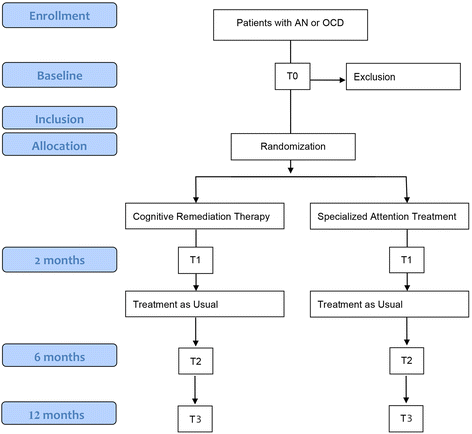Cognitive remediation therapy (CRT) as a treatment enhancer of eating disorders and obsessive compulsive disorders: study protocol for a randomized controlled trial
- PMID: 27832747
- PMCID: PMC5105298
- DOI: 10.1186/s12888-016-1109-x
Cognitive remediation therapy (CRT) as a treatment enhancer of eating disorders and obsessive compulsive disorders: study protocol for a randomized controlled trial
Abstract
Background: Anorexia nervosa (AN) and Obsessive Compulsive Disorder (OCD) are among the most incapacitating and costly of mental disorders. Cognitive Behaviour Therapy (CBT), medication, and combination regimens, to which in AN personalised guidance on weight control is added, are moderately successful, leaving room for more effective treatment algorithms. An underlying deficit which the two disorders share is cognitive inflexibility, a trait that is likely to impede treatment engagement and reduce patients' ability to benefit from treatment. Cognitive remediation therapy (CRT) is an easy-to-use intervention aimed at reducing cognitive inflexibility and thereby enhancing treatment outcome, which we aim to test in a controled study.
Methods: In a randomized-controlled multicenter clinical trial 64 adult patients with AN and 64 with OCD are randomized to 10 bi-weekly sessions with either CRT or a control condition, after which Treatment As Usual (TAU) is started. All patients are evaluated during single-blind assessments at baseline, post-CRT/control intervention, and after 6 months. Indices of treatment effect are disorder-specific symptom severity, quality of life, and cost-effectivity. Also, moderators and mediators of treatment effects will be studied.
Discussion: To our knowledge, this is the first randomized controlled trial using an control condition evaluating the efficacy and effectiveness of CRT as a treatment enhancer preceding TAU for AN, and the first study to investigate CRT in OCD, moreover taking cost-effectiveness of CRT in AN and OCD into account.
Trial registration: The Netherlands Trial Register NTR3865 . Registered 20 february 2013.
Keywords: Anorexia nervosa; Cognitive remediation; Obsessive compulsive disorder; Psychological treatment.
Similar articles
-
Remediating cognitive inflexibility in obsessive compulsive disorder and anorexia nervosa neither moderates nor mediates treatment effects: an exploratory study.Front Psychiatry. 2025 Jan 13;15:1456890. doi: 10.3389/fpsyt.2024.1456890. eCollection 2024. Front Psychiatry. 2025. PMID: 39872433 Free PMC article.
-
Cognitive Remediation Therapy Does Not Enhance Treatment Effect in Obsessive-Compulsive Disorder and Anorexia Nervosa: A Randomized Controlled Trial.Psychother Psychosom. 2020;89(4):228-241. doi: 10.1159/000505733. Epub 2020 Feb 19. Psychother Psychosom. 2020. PMID: 32074624 Clinical Trial.
-
Mindfulness-based cognitive therapy in obsessive-compulsive disorder: protocol of a randomized controlled trial.BMC Psychiatry. 2014 Nov 18;14:314. doi: 10.1186/s12888-014-0314-8. BMC Psychiatry. 2014. PMID: 25403813 Free PMC article. Clinical Trial.
-
A preliminary systematic review and meta-analysis of randomized-controlled trials of cognitive remediation therapy for anorexia nervosa.Eat Behav. 2020 Apr;37:101391. doi: 10.1016/j.eatbeh.2020.101391. Epub 2020 May 3. Eat Behav. 2020. PMID: 32408265 Free PMC article.
-
The importance of improving cognitive flexibility in adolescents with anorexia nervosa: The case for cognitive remediation therapy.Int J Eat Disord. 2024 May;57(5):1109-1118. doi: 10.1002/eat.24164. Epub 2024 Feb 9. Int J Eat Disord. 2024. PMID: 38333943 Free PMC article. Review.
Cited by
-
Cognitive and Experienced Flexibility in Patients With Anorexia Nervosa and Obsessive Compulsive Disorder.Front Psychiatry. 2022 May 9;13:868921. doi: 10.3389/fpsyt.2022.868921. eCollection 2022. Front Psychiatry. 2022. PMID: 35615449 Free PMC article.
-
Remediating cognitive inflexibility in obsessive compulsive disorder and anorexia nervosa neither moderates nor mediates treatment effects: an exploratory study.Front Psychiatry. 2025 Jan 13;15:1456890. doi: 10.3389/fpsyt.2024.1456890. eCollection 2024. Front Psychiatry. 2025. PMID: 39872433 Free PMC article.
-
SHOULD PEDIATRICIANS INVESTIGATE THE SYMPTOMS OF OBSESSIVE-COMPULSIVE DISORDER IN CHILDREN WITH FEEDING DIFFICULTIES?Rev Paul Pediatr. 2019 Jan-Mar;37(1):104-109. doi: 10.1590/1984-0462/;2019;37;1;00010. Epub 2018 Oct 29. Rev Paul Pediatr. 2019. PMID: 30379278 Free PMC article. Review.
-
Neural Correlates of Executive Functioning in Anorexia Nervosa and Obsessive-Compulsive Disorder.Front Hum Neurosci. 2022 May 26;16:841633. doi: 10.3389/fnhum.2022.841633. eCollection 2022. Front Hum Neurosci. 2022. PMID: 35693540 Free PMC article. Review.
-
The shifting perspectives study protocol: Cognitive remediation therapy as an adjunctive treatment to family based treatment for adolescents with anorexia nervosa.Contemp Clin Trials. 2021 Apr;103:106313. doi: 10.1016/j.cct.2021.106313. Epub 2021 Feb 1. Contemp Clin Trials. 2021. PMID: 33539993 Free PMC article.
References
-
- American Psychiatric Association [APA] Diagnostic and statistical manual of mental disorders, fourth edition, text revision (DSM-IV-TR) Washington DC: American Psychiatric Association; 2000.
Publication types
MeSH terms
LinkOut - more resources
Full Text Sources
Other Literature Sources
Medical
Research Materials


